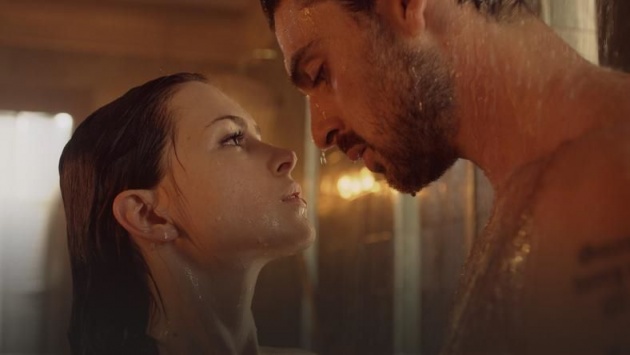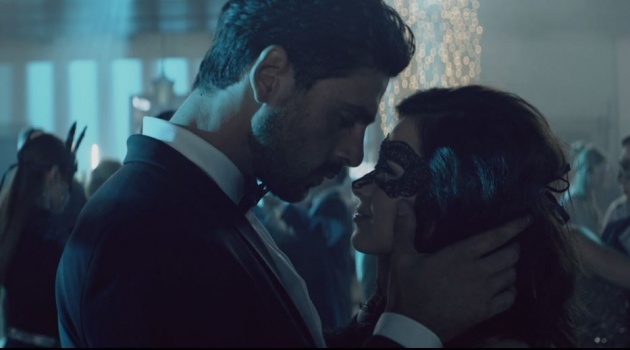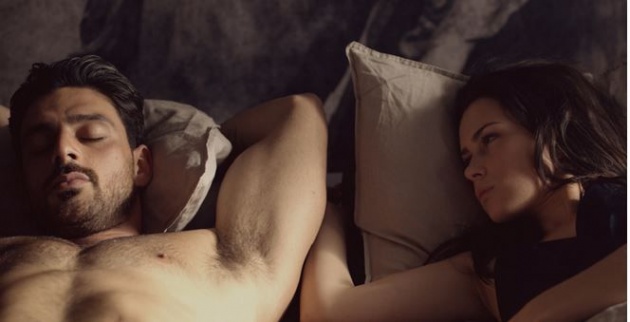Pictured: 'You'll have a ball' Massimo (Michele Morrone) makes a promise to Laura (Anna Maria Sieklucka) in the erotic drama, '365 Dni' (365 Days) adapted from Blanka Lipińska's 2018 and co-directed by Barbara Bialowąs and Tomasz Mandes). Still courtesy of Next Film (Poland)
Back in 2013, the website goodreads.com listed 445 books in the sub-genre of ‘romance or erotica with kidnapping’. If the list was updated, ‘365 Days’ by the Polish author Blanka Lipińska, first published in 2018, would be added to it. It is thoroughly generic stuff. Whilst on holiday with her dolt of a boyfriend, Laura is followed and abducted by Massimo, a brooding but forceful young Italian mob boss. He gives her 365 days for her to fall in love with him, after which, if she is still immune to his charms, he will let her go. Laura naturally resists and engages in a tango of deferred gratification. I haven’t read it, but the novel was rated one star by Justyna Świątkiewicz on the above-mentioned website. Now it has been turned into a film, co-directed by Barbara Bialowąs and Tomasz Mandes, who co-wrote the screenplay with Tomasz Klimala, in the anticipation that it would duplicate Fifty Shades of Grey’s box office success. Whether it will do so in Poland remains to be seen. Here in the UK it is being screened in selected cinemas once a day, attracting some of the large Polish diaspora, who engaged mainly with the scenes in their native language.
The film begins in Lampedusa with Massimo (Michele Morrone) witnessing the death of his father, after he refused to work with a criminal gang involved in sex trafficking. At first you think both men have been killed, the bullet piercing the old man’s body and hitting Massimo. Alas, he lived to take over the family business, travelling (five years later) to San Francisco to demand a return on his poor performing share portfolio. As innuendo would have it, he doesn’t do poor performance. The film cuts between two business meetings in broadly identical rooms, one of which involves Massimo involved in blackmail, the other featuring Laura Biel (Anna Maria Sieklucka), who gets a call into her boss’ office. Laura lives in a very nice apartment with her boyfriend, Martin (Mateus Lasowski) who is working on his laptop while the television is on – he doesn’t do energy efficiency. Laura makes an appeal to his libido, which Martin resists, reminding her that she needs to pack for their upcoming holiday. Disappointed, Laura entertains herself in bed with an electronic pleasuring device (no, not a Kindle) and there is more cross-cutting between her and Massimo.
Arriving in Sicily, Laura celebrates her 29th birthday with Martin and her best friend, Olga (Magdalena Lamparska). Making a trip to the bathroom, she appears to be followed by Massimo, who asks her in English, ‘where are you going, little girl?’ How he knew she would understand him is one of the film’s contrivances. He disappears. The next day, sunbathing by the pool and drinking wine, Laura is appalled to discover that Martin has visited Mount Etna on his own. She leaves in disgust. Wandering around the resort town at night, Laura takes a series of wrong turns, eventually ending up in the arms of Massimo who puts her to sleep.
The costume designers Magdalena Sekrecka and Malgorzata Skorupa do the film proud, not so much with Laura’s skimpy dresses but for Martin’s busy t-shirts that scream, ‘I don’t want to make an effort’. Their work is the only aspect of the film that deserves praise. Meanwhile Laura awakens in a large locked bedroom into which eventually steps Massimo. He explains that she was the first person he saw when revived from the shooting five years ago. His house boasts a large painting of her. When he saw her at the airport, he knew he had to have her. All this he explains in English. PS, he explains, your boyfriend cheated on you. Massimo has the black and white photographs to prove it, although there is no need for them to be in black and white – we live in a digital age. He then makes the 365-day offer. Laura resists. Later, she finds the door unlocked and wanders downstairs where she meets two other men; one, Domenico (Otar Saralidze) becomes her minder, the other is Massimo’s trusted advisor, Mario (Bronislaw Wroclawski).
Massimo’s anti-sex-trafficking credentials are re-established when he greets his captive, a young man tied and spread-eagled, who engaged in said activity. Laura witnesses Massimo killing him on the lawn as she tries to escape. What follows are a series of scenes in which Massimo tries to appeal to her senses. She finds herself waking up next to him, although he hasn’t touched her. She then teases him by having a shower right in front of him. He has a shower next to her – the showers and double bed are in the same room. He catches her looking. The camera moves from his torso to his backside. There is tension of a sort, but Massimo is seeking consensus, a courtesy he didn’t extend on a private jet in an early scene, in which he coerces the stewardess to perform a sexual act.
Viewers of erotic fiction will know what to expect as Massimo exerts his power over Laura but falls short of rape. He also gets the chef to make pierogi (Polish dumplings) for her. ‘My grandmother makes it better,’ she tells the chef, ‘I will give you lessons’. The set decorator is somewhat less imaginative than the costume designer. Massimo’s long (outdoor) dining room table is filled with fresh fruit, which separates Massimo and Laura. Who eats fresh fruit before dinner?
There are the inevitable shopping trips and a scene in which Massimo puts Laura in chains. He is then pleasured by another woman in front of her. Every so often, Massimo will tell her what she is doing next: ‘you’re going on a trip / to a club / to a ball’. You are never entirely sure why Laura has to go, though she eats an ice cream provocatively in front of one of Massimo’s associates.
The sexual politics of the film are dire. Massimo is very much of the opinion that all women need to be happy is sex and shopping – but not food. There isn’t a decent restaurant scene in the entire film. For her part, Laura starts a gang war when she teases one of Massimo’s rivals at a club – he has to save her from being raped. He also saves her after she falls from his motorboat; a scene that proves to be the turning point.

Pictured: Laura (Anna Maria Sieklucka) and Massimo (Michele Morrone) wash up in the erotic drama, '365 Dni' (365 Days). Still courtesy of Next Film (Poland)
Laura eventually meets Massimo’s jilted lover, Anna (Natasza Urbanska) who threatens to kill her. Just when you think that the only way that the film will end is for Massimo to die, there is a minor surprise.
After a certain point, there are multiple sex scenes that essentially stop the movie, set to rock tunes like 'Here comes the Thunder'.. You find yourself wanting some plot. Incident is more talked about than shown. Massimo pulls two guns on a member of a rival gang and Laura is later told that he killed him. But we don’t see it. Bialowąs doesn’t want to glorify violence or indeed show much of it; to paraphrase an earlier line, women don’t need to see that stuff.
Massimo’s tattoos are more interesting than his personality; you wonder if he has an International Standard Book Number to go with them. Of course, uncouth thugs have tattoos to record important stuff, like cell phone numbers or a reminder to bring home cat food.
Returning to the story after Laura is sent back to Poland, Olga provides some much-needed comic relief. The audience noticeably responded to her energy; she seemed to represent them. Martin too makes a comeback, dressing smartly this time. Laura is very keen to introduce him to Massimo, but Martin retreats hastily.
The finale of the film is moralistic. Polish women can’t expect a life of happiness with handsome rich gangsters. Nor should they seek sexual gratification. Although Lipińska has written two other books, we should not expect a Fifty Shades-style trilogy, unless it is based on Massimo misremembering the woman who appeared to him after he awoke from a shooting and does the whole kidnapping thing again.
Reviewed at Cineworld Wood Green, North London (Screen Four), Saturday 15 February 2020, 20:30 screening. Trailer with English subtitles not available





